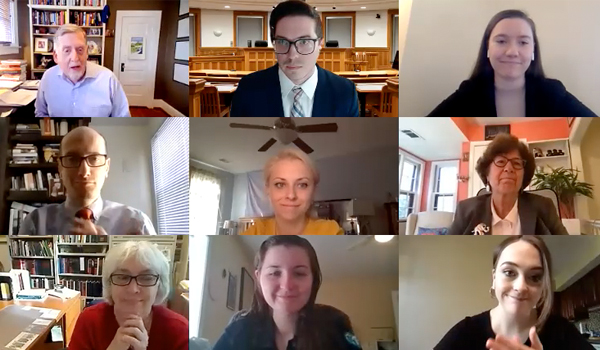 At an April 6 event co-sponsored by the Diversity and Inclusion Advisory Council, the Black Law Students Association (BLSA), the Women's Law Caucus (WLC), and the Student Bar Association (SBA), Catholic Law students, faculty, and staff gathered virtually for a discussion regarding “Lawrence v. Texas: 18 years later,” led by the litigator who argued the case before the Supreme Court—Paul M. Smith. Smith is a Professor from Practice at Georgetown Law, as well as the Vice President for Litigation and Strategy at the Campaign Legal Center. Until 2017, Smith worked in private practice at Jenner & Block LLP. He has presented oral arguments in 21 Supreme Court cases, Lawrence v. Texas among them.
At an April 6 event co-sponsored by the Diversity and Inclusion Advisory Council, the Black Law Students Association (BLSA), the Women's Law Caucus (WLC), and the Student Bar Association (SBA), Catholic Law students, faculty, and staff gathered virtually for a discussion regarding “Lawrence v. Texas: 18 years later,” led by the litigator who argued the case before the Supreme Court—Paul M. Smith. Smith is a Professor from Practice at Georgetown Law, as well as the Vice President for Litigation and Strategy at the Campaign Legal Center. Until 2017, Smith worked in private practice at Jenner & Block LLP. He has presented oral arguments in 21 Supreme Court cases, Lawrence v. Texas among them.
The evening’s program aimed to explore the intersection of constitutional law and LGBTQ rights through the lens of the Lawrence case. After welcoming remarks and introductions made by student leaders Hunter Daley (3L) and Meghan Moorhouse (3L), Smith provided his reflections on the professional arc of his career, from law school to arguing Lawrence before the Supreme Court. Smith outlined his 36-year career in private practice—including earning a spot as a member of the Supreme Court Bar and his work as a leading litigator for LGBTQ and civil rights—while also providing the group with the cultural and legal context in the United States at the time of Lawrence. Smith then shifted to focus on the details of Lawrence more specifically. When speaking about argument day in front of the Supreme Court, Smith shared, “We all knew that this was history being made.” Smith then added a few thoughts on how the Lawrence decision ultimately laid the groundwork for future constitutional challenges for LGBTQ rights—citing United States v. Windsor (challenging the Defense of Marriage Act (DOMA)), Hollingsworth v. Perry (challenging California's Proposition 8), and Obergefell v. Hodges (arguing for marriage equality).
With the time that remained, Smith fielded questions from the audience addressing topics including how to navigate questions posed by Supreme Court justices, Justice Scalia’s dissent in Lawrence, culture’s influence on the law, and advice for law students interested in LGBTQ advocacy.
In speaking about the event, Moorhouse shared, "Learning about Lawrence from the attorney who argued it before the Supreme Court made this an incredibly rewarding event for CUA Law’s LGBTQ students. Professor Smith was a great speaker and I learned more about the case’s history and subsequent case law than I ever had before." Daley added, “We hope this will be one of many events at CUA Law that give students an opportunity for professional development through the examination of LGBTQ legal topics."
